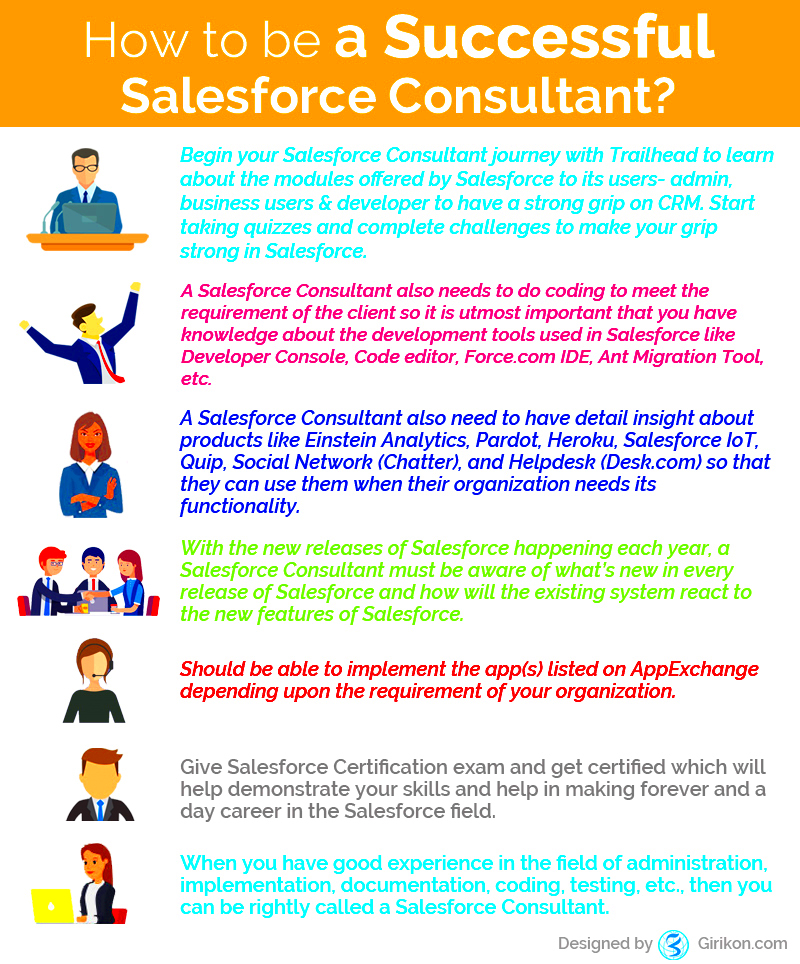The term Salesforce consultant refers to a professional who aids companies in implementing and optimizing Salesforce solutions. The consultants have an important task of making certain that firms can adequately apply Salesforce to satisfy their particular requirements. Usually, this includes examining a particular company’s operations, establishing areas that need modification, and creating tailored alternatives. Additionally, they would train people within the organization as well as give follow-up information so that the system can be sustained successfully.
Here are some of the main roles that are played by a Salesforce advisor:
- Assessing client needs and recommending Salesforce solutions
- Customizing Salesforce to fit specific business requirements
- Conducting training sessions for staff
- Providing ongoing support and troubleshooting
- Staying updated with Salesforce features and best practices
Key Skills Required for Salesforce Consulting

In order for you to succeed as a Salesforce consultant, you will require both technical and interpersonal expertise. Below are some of the core abilities that are necessary:
- Salesforce Knowledge: A deep understanding of Salesforce features, tools, and best practices is crucial.
- Analytical Skills: The ability to analyze business processes and identify areas for improvement.
- Communication Skills: Clear communication with clients and team members is essential for success.
- Project Management: Managing multiple projects and timelines effectively.
- Problem-Solving: Ability to troubleshoot issues and provide practical solutions.
By learning these skills, you will not only help yourself in your position of consultant but also be more attractive to customers-to-be.
Also Read This: What to Do on Fiverr to Make Money
Steps to Get Started as a Freelance Salesforce Consultant

Having an opportunity to begin a career as a free-lancer in the field of Salesforce can be both thrilling and fulfilling. The following are the guidelines to help you out in this.
- Gain Experience: Work in roles that allow you to use Salesforce regularly. This experience is invaluable.
- Get Certified: Earning Salesforce certifications, such as Salesforce Administrator or Salesforce Consultant, can enhance your credibility.
- Create a Portfolio: Document your projects and successes. A strong portfolio showcases your expertise.
- Network: Attend Salesforce events, join online forums, and connect with other professionals to build your network.
- Set Up Your Business: Establish your freelance business by creating a website, determining your rates, and deciding on your service offerings.
- Market Your Services: Use social media and platforms like Fiverr to promote your consulting services and attract clients.
A solid basis for your freelancing career can be built through these actions with one gaining all the freedom and prospects that come along with it.
Also Read This: How to Send Out a Gig on Fiverr: A Step-by-Step Guide
How to Build Your Salesforce Portfolio
In order to demonstrate your talents and entice potential clientele, it is mandatory that you create a solid portfolio as a Salesforce consultant. The portfolio should depict the experience you have gained; project specifications that you have worked on; and what was produced as a result of those projects. Consider it as a personal advertising tool that emphasizes your capabilities. Some useful methods of creating an amazing salesforce portfolio will be discussed next.
Here’s how to get started:
- Document Your Projects: Include details of the Salesforce projects you’ve worked on. Mention the challenges faced and how you solved them.
- Showcase Results: Whenever possible, quantify your success. For example, state how your implementation improved sales by a certain percentage.
- Gather Testimonials: Ask past clients or colleagues for feedback on your work. Positive testimonials can greatly enhance your credibility.
- Create Case Studies: Develop case studies for significant projects. Outline the problem, your approach, and the outcome.
- Use Visuals: Incorporate screenshots of your work in Salesforce, diagrams of processes you’ve designed, or charts showing improvements.
Do not forget that your portfolio must be effortlessly accessible thus think about making a website or using platforms such as LinkedIn to showcase the work you have done. Updating it is very important because with more knowledge, new assignments can emerge.
Also Read This: How Many Sellers are on Fiverr: An In-Depth Analysis
Finding Clients as a Salesforce Consultant
When your talents and portfolio have been secured, the subsequent course of action is to seek for clients. Luring in clients might prove difficult; however, when employed correctly, you may establish a strong customer base. Here are some practical approaches to getting customers when working as a Salesforce advisor:
- Networking: Attend Salesforce events, meetups, and workshops. Connecting with others in the industry can lead to referrals.
- Online Presence: Create a professional website and optimize your LinkedIn profile. Share insights related to Salesforce on social media.
- Freelance Platforms: Utilize platforms like Fiverr and Upwork to list your services and reach a broader audience.
- Referrals: Encourage satisfied clients to refer you to others. Offering a small incentive can motivate them to spread the word.
- Cold Outreach: Identify businesses that may benefit from your services and reach out directly via email or LinkedIn.
The process of finding new clients can be a slow one, but in the end persistence and effective marketing strategy will eventually yield results. Always keep in mind that maintaining good relations with your existing clients is a way to inspire them to keep coming back for more.
Also Read This: How to Get Work on Fiverr as a Beginner
Setting Your Rates and Managing Finances
Being a freelance Salesforce professional requires careful consideration of your rates and how you manage your finances. Effective pricing strategies and good record keeping will help enhance the stability of your finances. This is how you can do it:
Setting Your Rates:
- Research Market Rates: Check what other Salesforce consultants are charging. Rates can vary based on experience, location, and demand.
- Determine Your Value: Consider your skills, certifications, and the complexity of the projects you handle. This can help justify your rates.
- Choose a Pricing Model: Decide whether you want to charge hourly, by project, or through retainers. Each model has its benefits.
Managing Finances:
- Track Your Income: Use accounting software to keep track of your income and expenses. This will simplify tax time.
- Set Aside for Taxes: Remember to set aside a portion of your earnings for taxes. As a freelancer, you are responsible for your own taxes.
- Create a Budget: Establish a monthly budget that includes your personal and business expenses. This helps maintain financial discipline.
Salesforce consultants can establish a freelance business that thrives through careful pricing and financial management.
Also Read This: How to Become a Freelance Marketing Expert
Staying Updated with Salesforce Trends and Updates
For a consultant, it’s obligatory to be on top of Salesforce trends and updates in this tech-mad world. Salesforce is constantly releasing new features and enhancements, hence knowing these changes will arm you with a competitive advantage. By keeping yourself updated in knowledge; you can assist your clients better and perform well when they are using Salesforce. Here are some efficient strategies to stay informed:
- Follow Salesforce Blogs: Subscribe to Salesforce's official blog and other reputable blogs that cover Salesforce news and trends. This will keep you informed about new releases and best practices.
- Join Online Communities: Engage with forums like the Salesforce Trailblazer Community. Here, you can ask questions, share experiences, and learn from others in the field.
- Attend Webinars and Events: Participate in Salesforce events, webinars, and user group meetings. These gatherings offer insights directly from Salesforce experts and product managers.
- Take Online Courses: Utilize platforms like Trailhead, Salesforce's learning platform, to access free courses and modules that help you stay up to date on new features.
- Network with Other Professionals: Connecting with fellow Salesforce consultants can provide valuable information about industry trends and innovative practices.
In addition to choosing the right technology stack, it is important for an organization’s leadership to ensure that their employees are being taught how to use the system properly. Addressing technical changes independently might lead to staff not using systems effectively. Since systems and processes tend to change constantly because of technological advancement, it is crucial for Salesforce professionals’ training to be continuous. Active interactions should be kept up with particular training materials that will assist in maintaining knowledge about Salesforce within the employee’s mind for some time after training course completion. Thus they would be able to provide high-quality services in this area at all times without failure. In combination with this there must also exist a mechanism for knowledge retention in all these areas since it always leads loss of experience hence impairing performance. Thus through using training aids everyone stays updated on developments impacting his or her job at any given period.
By keeping yourself engaged with those resources, you can keep your Salesforce knowledge fresh and relevant; this is very important if you want to provide the best services possible to your customers.
Also Read This: How to Add My Portfolio to Fiverr
Frequently Asked Questions
In case you are an independent Salesforce advisor who alternates between consulting companies regarding their sales automation systems throughout and understands them better than anyone else, you might have inquiries regarding your career path and the difficulties that lie ahead. The following frequently asked questions should provide you with more insights about what it is all about:
- What certifications should I obtain? Start with foundational certifications like Salesforce Administrator and Salesforce Consultant. As you gain experience, consider advanced certifications to enhance your expertise.
- How do I price my services? Research the market to determine average rates. Consider your experience, skills, and the complexity of the projects you handle when setting your prices.
- How can I build my client base? Networking, creating a strong online presence, and leveraging freelance platforms are excellent ways to attract clients.
- What should I include in my portfolio? Document your projects, include case studies, and gather testimonials from past clients to showcase your skills and success.
- How do I manage my finances as a freelancer? Keep track of your income and expenses using accounting software, and set aside money for taxes to ensure financial stability.
Thus, if you deal with these typical issues you will have a clearer and more confident path in freelancing.
Conclusion
A career as a freelance Salesforce consultant may prove to be both rewarding and lucrative. By equipping yourself with the right skills, knowledge and techniques, you can assist companies enhance their Salesforce experience thus achieving success. Take note that concentrating on building an impressive portfolio, sourcing for customers and keeping abreast of the latest trends in the industry are key factors. This is because up-to-date information and flexibility would make you stand out amongst others.
Keep honing your skills, expanding your network as you progress in freelancing career. Even though it comes with difficulties, but with commitment and love for it, you can make it to be a successful consulting enterprise that achieves your objectives. Look forward to whatever lies ahead and do not forget that every assignment is an opportunity towards mastery in Sales force consultancy.




